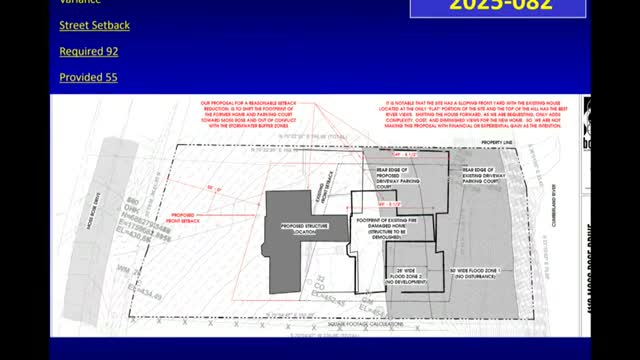Architect Proposes Home Rebuild in Flood Zone After Fire on Brush Hill Road
August 22, 2025 | Board of Zoning Appeals Meetings, Nashville, Davidson County, Tennessee
Thanks to Scribe from Workplace AI , all articles about Tennessee are free for you to enjoy throughout 2025!

This article was created by AI using a video recording of the meeting. It summarizes the key points discussed, but for full details and context, please refer to the video of the full meeting. Link to Full Meeting
Craig Kennedy, the architect representing the homeowners, presented the case, emphasizing the unique hardships faced by the family. He noted that the original footprint of the home lies within both Flood Zone 1 and Flood Zone 2, raising concerns about future flooding risks. Kennedy explained that the proposed new home would closely resemble the previous structure, aiming to push it slightly forward to comply with setback requirements while navigating the complexities of the flood buffer zones.
The discussion highlighted the steep topography of the area, with Kennedy pointing out that if flooding were to occur, it could have devastating effects on nearby neighborhoods. He described the existing homes as a "mishmash," with varying distances from the road, complicating the contextual alignment of the new build. The architect expressed the need for clarity on the allowable building parameters, given the limited space available due to flood regulations.
Board members engaged in a thoughtful dialogue about the implications of the flood zones, questioning whether the design could be adjusted to better fit the landscape while still adhering to safety regulations. One member raised concerns about the visibility of the new structure in relation to neighboring homes, noting that the large lots in the area might lessen the impact of the new build's positioning.
As the meeting progressed, the tension between adhering to zoning laws and accommodating the homeowners' needs became evident. The board members acknowledged the importance of maintaining safety standards while also considering the unique circumstances of the property. The conversation underscored the ongoing challenges faced by residents in flood-prone areas, where rebuilding efforts must balance personal aspirations with regulatory constraints.
In conclusion, the board's deliberations on this case reflect a broader narrative in Nashville, where the interplay of natural landscapes, urban development, and community safety continues to shape the city's growth. As the homeowners await a decision, their story serves as a poignant reminder of the resilience required to rebuild in the face of adversity.
Converted from 08/21/25 Board of Zoning Appeals meeting on August 22, 2025
Link to Full Meeting
Comments
View full meeting
This article is based on a recent meeting—watch the full video and explore the complete transcript for deeper insights into the discussion.
View full meeting
